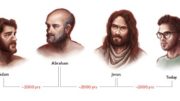Theories of the origin of language are first discussed from a linguistic point of view in secular writing. Evolution had less effect on linguistics than on other social sciences, yet history shows that secondary effects were felt. No true link has ever been found with animal communication. The work of Noam Chomsky brought linguists back to uniquely human origins for language, but the question is so complex that little headway can be made without investigation of mental factors.
 This survey concludes that the creative, miraculous element must be invoked, and the Bible itself gives hints of important features in the understanding of linguistic processes.
This survey concludes that the creative, miraculous element must be invoked, and the Bible itself gives hints of important features in the understanding of linguistic processes.
(see related resources on VCA Creation section)
In discussing linguistic origins, people with some biblical background will often confuse language and languages. In such a discussion, thoughts often settle first on the Tower of Babel. However, the Bible indicates that there were two distinct miraculous events: the original creation of Adam as a talking and understanding being; and the subsequent division of humanity into language groups as a judgment on the rebellion of the descendants of Noah. This article is concerned with the former.
But first, the question of pre-programming for language, as against a learning process, is not strictly relevant to the question of the creation of a linguistic ability. However, the Lockean assumption of a “clean slate” before learning went to extremes with behaviourists like B.F. Skinner, who dominated language learning in mid-century. The arrival of the linguist Chomsky on the scene restored a balance, in that it favoured a pre-programming prior to learning.
This pre-programming represented the universal human linguistic gift, quite distinct from whether someone is a “good linguist”, meaning that they are good at learning foreign languages. All humans have a “linguistic gift”, given, I believe, at creation, but only some can operate in more than one specific language easily. Our English language is deficient in that we cannot in argument terminology distinguish between these two uses of the term “linguistic gift”. In this article I deal with the ability to speak a “mothertongue”, which is all I am referring to, and not to the additional gift of being what popular jargon calls a “linguist”.
It was Noam Chomsky who restored interest in human universal ability to speak coherently, and he restored the balance by criticising the “empty slate” stance of Skinner and others, saying that this was insufficient to account for all the facts. It is significant that Chomsky, though an agnostic, still regarded human language as “miraculous”, distinguishing humans from animals. To that extent he departed from some evolutionist assumptions. Naturally, a human exposed to a specific language would not speak coherently, so there must be an environmental catalyst. It is not true that feral children have no programmed ability to understand any future language to which they would become exposed, as will be seen by reference to evidence later in this article. It may be, of course, that if a feral child managed to reach adulthood without ever contacting a language environment, such an ability might have atrophied by the time of post-puberty, as hypothesised by some of the Chomsky school.
But my chief aim in this article is to exult in the wonder of the signs of God’s creative gift, as witnessed in the human mind.
Most secular writers have avoided the question during most of the twentieth century. This attitude can be traced to the changed interests of linguists consequent on the seminal work of Ferdinand de Saussure, especially the proposition that “states of language” are far more significant to linguists than the history of language.1 His terms were “synchronic” (non-historical) as opposed to “diachronic” (historical) studies.
This was a reaction against the nineteenth century preoccupation with what used to be called “philology”, in which etymology and the establishment of boundaries between language families were key ingredients. The pendulum is slowly swinging back to the study of language in history, partly through interest in the way pidgins and Creoles come about, and in language change.
From animals to humans?
As regards the origin of language per se, it should be noted that when evolution was first applied to linguistics, early attempts at linking human language to animal communication were the chief subjects of debate. How could chattering ape-folk transform a needs-motivated set of habits into the phonological complexity we now call language? The animals can on their own terms communicate, but not in the positive sense of reading the communicator’s mind or intentions, though in those days “mind” was itself a taboo word. Most animal cries relate to distress, belonging to the pack, mating approaches or antagonism.
Continue reading on Creaton.com




